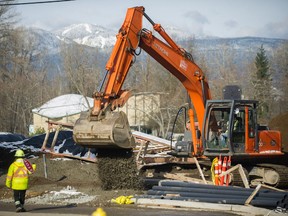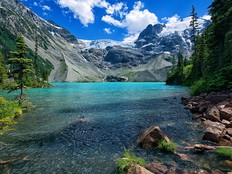Musqueam development will double population of University Endowment Lands

Article content
Massive development by the Musqueam First Nation near the University of B.C. will almost double the population of the University Endowment Lands, and the province is developing the area’s neighbourhood plan to prepare for the influx of new residents.
And the endowment lands’ administration and some residents say this could be the start of densification of the land called Area D, which an elected council member predicts will transform the village into another concrete-and-glass neighbourhood like Yaletown.
A reconciliation deal returned 22 acres of a forested area of the endowment lands to the band, and the Musqueam were granted a zoning exemption from the four-storey building limit. That allowed the band to build residential towers as high as 18 storeys, and Mojan Nozari, a member of the Community Advisory Council for Area D, said she fears that’ll also change University Hill, where she’s lived since 2001.
“I believe it opens the gate for other owners to build higher-density developments,” she said. “It’s going to become a city, it’s not going to be a university village anymore. There is no way we can escape it.”
The province is calling for urban-planning or architecture firms to bid for a proposal to help develop Area D, bounded by University Boulevard, Acadia, Agronomy and Toronto roads and Wesbrook Mall, and home to almost three-quarters of the endowment lands’ 3,000 residents. Most live in multi-family units, including rentals.
The Musqueam’s planned 10-year development, which will add 1.2 million square feet of residential and 30,000 sq. ft. of commercial space, is expected to grow the endowment lands’ population by another 2,500 residents. The endowment lands are an unincorporated community, meaning it has no municipal council, and is directly governed by the province through the Municipal Affairs and Housing Ministry.
The ministry is appealing to professional planners for help in developing a neighbourhood plan to “guide future development, revitalize the sense of community and improve the sense of community,” and transit, ministry staff said in an email. It gives endowment lands’ residents input to “provide guidance for future development proposals.” The ministry’s call for proposals says the winning bid will help “review the structure of land-use regulation” and “identify regulatory options” for redevelopment proposals.
The endowment lands’ administration office didn’t return a request for comment.
But the latest endowment lands’ community newsletter called University Hill Connections, said the endowment lands “can also expect pressure to redevelop other portions of the multi-family neighbourhood (Area D) in the near future.” It said it also means residents can expect a rise in their taxes, now about 20- to 30-per-cent lower than Vancouver’s.
The newsletter says rising real-estate prices and speculation, Area D’s aging infrastructure and the Musqueam redevelopment, as well as a push for increased density across Metro Vancouver, are putting development pressures on Area D.
The advisory council approved the province’s call for proposals to develop a neighbourhood plan for Area D, said Justin LeBlanc, also an elected member of the advisory council for Area D. He said he supports the Musqueam’s right to develop their land as they choose to.
Residents will have a say on the future development of Area D and that doesn’t necessarily mean highrises, he said. “I’m not sure if the Musqueam development opens the door to denser or more development. Right now we have set limits for density.”
He said he wouldn’t oppose increased density as long as it included plans for affordable housing and rental accommodations.
LeBlanc, a scientist who attended UBC but who no longer works on campus, rents a suite above the shops in the village, which he says are “80-per-cent fast-food.” He said he would like to see fewer restaurants that rely on single-use, disposal-serving dishes, better waste disposal and improved bike lanes addressed in the neighbourhood plan.
Other residents’ concerns noted in a questionnaire include the increased demolition of older homes to be replaced by those of a West Coast contemporary design, the number of vacant homes, overgrown hedges, camper vans parked in residential areas, garbage and noise. Respondents in areas A, B and C, which are mostly single-family dwellings, weren’t concerned about density.
But Nozari, who owns a townhouse next to the Musqueam development, said she doesn’t welcome skyscrapers and more neighbours.
“I moved here because I liked living in nature and in a low-density neighbourhood,” she said. “I have the horizon and I can easily see the trees.”
She said she foresees traffic jams, insufficient parking and the lack of transit for residents in the university’s off-hours.
“I’m planning to move,” said Nozari, who works in architectural design. “Why should I drive all the way to my job downtown when this neighbourhood is going to look like it does downtown? That’s not what UBC should be.”
CLICK HERE to report a typo.
Is there more to this story? We’d like to hear from you about this or any other stories you think we should know about. Email vantips@postmedia.com.</p





Postmedia is committed to maintaining a lively but civil forum for discussion. Please keep comments relevant and respectful. Comments may take up to an hour to appear on the site. You will receive an email if there is a reply to your comment, an update to a thread you follow or if a user you follow comments. Visit our Community Guidelines for more information.